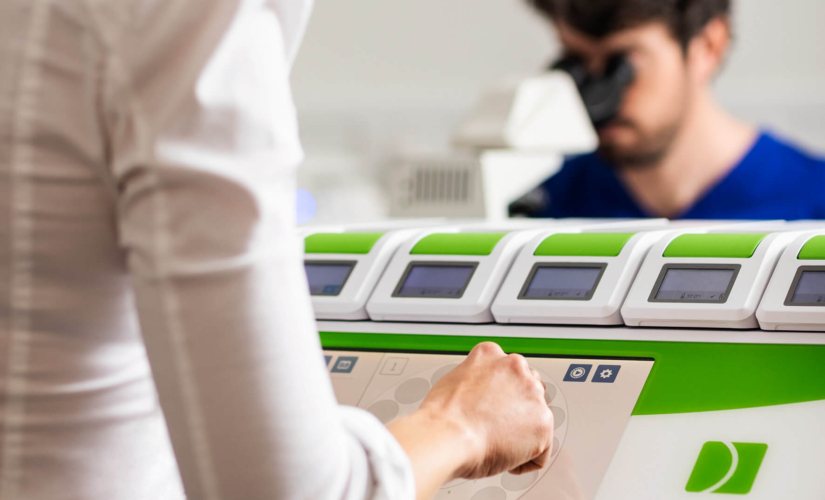What is the difference between IVF and ICSI?
If you’re beginning to explore fertility treatment options, it’s completely natural to have questions, especially when faced with fertility terms like IVF and ICSI. Both are widely used and effective treatments, but understanding the differences between them can feel confusing at first.
We asked Julija Gorodeckaja, our fertility consultant at the Evewell Harley Street, what each treatment involves, when they might be recommended, and how they can support you on your journey to growing your family. Whether you’re navigating male infertility, unexplained fertility issues, or previous unsuccessful treatment, our aim is to help you feel informed, supported, and confident in the next steps you choose.
What is IVF?
In Vitro Fertilisation (IVF) is a widely used fertility treatment in which an egg is fertilised outside the body, in a specialist laboratory, before being transferred into the uterus. It’s often recommended for individuals or couples experiencing challenges such as unexplained infertility, or age-related fertility decline.
The process begins with hormone treatment to encourage the ovaries to produce multiple follicles, each potentially containing a mature egg. Once ready, the eggs are collected through a simple procedure called egg retrieval. These eggs are then combined with sperm in the lab, and the developing embryos are closely monitored over several days. If suitable, one embryo is selected and transferred into the uterus with the aim of achieving pregnancy.
Find out more in our IVF step-by-step guide.
What is ICSI?
Intracytoplasmic Sperm Injection (ICSI) is a specialised form of IVF that’s often used when there are issues with sperm quality, such as low count, poor motility, or abnormal shape.
The main difference between IVF and ICSI is how the egg is fertilised. With ICSI, instead of allowing the sperm to fertilise the egg naturally in the lab, a single healthy sperm is carefully selected and injected directly into the egg. This technique can increase the chances of fertilisation in situations where standard IVF might not be effective.
Once the egg has been fertilised, the rest of the process is the same as IVF – the embryos are closely monitored, and if suitable, one is selected for transfer into the uterus.
What is the difference between IVF and ICSI?
IVF and ICSI are both forms of fertility treatment, and while they share many steps – such as egg collection, embryo development, and embryo transfer – the main difference lies in how the eggs are fertilised.
With IVF, eggs and sperm are placed together in the lab, allowing fertilisation to happen naturally. With ICSI, a single sperm is selected and injected directly into each egg, helping to overcome specific challenges with sperm quality or function.
Here’s a quick summary of the key differences between ICSI and IVF:
- How fertilisation happens:
IVF: Sperm and egg are combined in a dish to fertilise naturally
ICSI: A single sperm is injected directly into the egg - When each treatment is typically used:
IVF: Often used for a range of fertility issues, including unexplained infertility, or age-related decline
ICSI: Typically used when there are male fertility issues, such as low sperm count or poor motility - Sperm requirements:
IVF: Requires a larger number of healthy, motile sperm
ICSI: Can be successful with fewer sperm, including those surgically retrieved or from frozen samples
While the choice between IVF and ICSI depends on individual circumstances, your fertility specialist will guide you through the most appropriate option based on your medical history, fertility test results, and personal preferences – always with your goals and well-being in mind.
Who is IVF recommended for?
IVF is often recommended for those with conditions such as blocked or damaged fallopian tubes, ovulation issues, or hormone deficiencies. It may also be suggested when other treatments haven’t been successful, or when the cause of infertility is unexplained.
IVF is also commonly used in cases where age may be a factor, particularly for individuals in their mid-30s and beyond, as fertility can naturally decline over time. It can support people using donor eggs or sperm, same-sex couples, or single individuals looking to grow their family.
Who is ICSI recommended for?
ICSI is most commonly recommended for individuals or couples experiencing male factor infertility, where there may be issues with the number, movement, or shape of sperm.
You may be recommended ICSI if:
- You or your partner have a low sperm count
- The sperm has poor motility (movement)
- The sperm has abnormal shape or structure
- Previous IVF cycles have resulted in poor or no fertilisation
- Sperm is being used from a frozen sample
- Sperm has been surgically retrieved
- Donor sperm is being used in specific circumstances
What are the benefits of ICSI?
ICSI is a targeted approach that can be especially beneficial when working with very low numbers of sperm, frozen or surgically retrieved sperm, or where previous IVF attempts have not led to fertilisation. For many, ICSI provides a greater sense of reassurance and a clearer path forward on their fertility journey.
What factors might influence your IVF vs ICSI decision?
Deciding between IVF and ICSI is a personal decision, and your fertility specialist will guide you based on your individual circumstances. Both treatments can offer positive outcomes, but there are a few key factors that may help determine which option is most suitable for you.
These may include:
- Sperm quality: If there are issues with sperm count, motility, or shape, ICSI may be recommended to improve the chances of fertilisation.
- Fertilisation history: If previous IVF cycles have resulted in poor or no fertilisation, ICSI might be a better approach.
- Use of donor or frozen sperm: ICSI can sometimes offer higher success rates when using frozen or surgically retrieved sperm.
- Financial considerations: ICSI is usually slightly more expensive than standard IVF, so cost may also play a role in the decision-making process.
How can Evewell support you with your IVF vs ICSI decision?
At The Evewell, we understand that choosing the right fertility treatment can feel overwhelming – especially when faced with new terms and unfamiliar decisions. That’s why we take the time to get to know you, not just your medical history but your personal goals, emotional wellbeing, and any concerns you may have.
Whether IVF or ICSI feels like the right step, our expert team will offer clear, compassionate guidance tailored to your unique situation. If you’re ready to take the next step, we encourage you to book a consultation with one of our experts, who will talk you through all your options and provide advice tailored to your personal situation. We look forward to being part of your journey.





